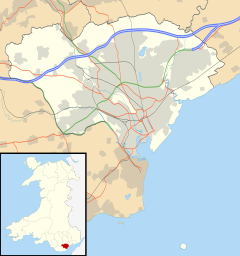Castle Quarter
Castle Quarter
|
|
|---|---|
 The Clock Tower of Cardiff Castle |
|
| Castle Quarter shown within Cardiff | |
| Principal area | |
| Ceremonial county | |
| Country | Wales |
| Sovereign state | United Kingdom |
| Post town | CARDIFF |
| Postcode district | CF10 |
| Dialling code | 029 |
| Police | South Wales |
| Fire | South Wales |
| Ambulance | Welsh |
| EU Parliament | Wales |
| UK Parliament | |
| Welsh Assembly | |
Castle Quarter (Welsh: Cwr y Castell) is an independent retail destination area in the north of the city centre of Cardiff, Wales. Castle is also a community (parish) of Cardiff.
The Castle Quarter includes some of Cardiff's Victorian and Edwardian arcades: Castle Arcade, High Street Arcade and Duke Street Arcade, and principal shopping streets: St Mary Street, High Street, Castle Street and Duke Street. The Castle Quarter hosts over 80 independent businesses.
Development of the area by Cardiff Council began in February 2010 aiming to create the Castle Quarter, particularly High Street and St Mary Street, into a pedestrian friendly environment to enhance the city centre. In 2014 the shopping arcades and other major properties in the Castle Quarter were purchased by property firms with view to restoration and improvement.
The recent restoration work has seen The Castle Quarter embrace it's Victorian and Edwardian roots. The ethos behind this is to reintroduce people to authentic Cardiff, independent retailers in the heart of the city.
The modern Castle Quarter is generally defined as the part of the city centre closest to Cardiff Castle, including the Castle Arcade, High Street Arcade and Duke Street Arcades, High Street and St Mary Street, Castle Street/Duke Street and Westgate Street.
The original first floor of Truffles tea room was once the residence of John Wesley where he first began his preaching of Methodism.
Riots took place during the 16th century between supporters of the rivalling Herberts family, who hailed from the Friary, and the Mathews family of Radyr. Herbert’s servants were all arrested in the course of their fighting and how he was able to free them all because his brother was the town sheriff. The street may have been as bustling with activity as much back then as it is today, albeit with a very different kind of activity. There would have been market stalls, but also stocks, whipping posts and there was even a jail house on this street.
...
Wikipedia

